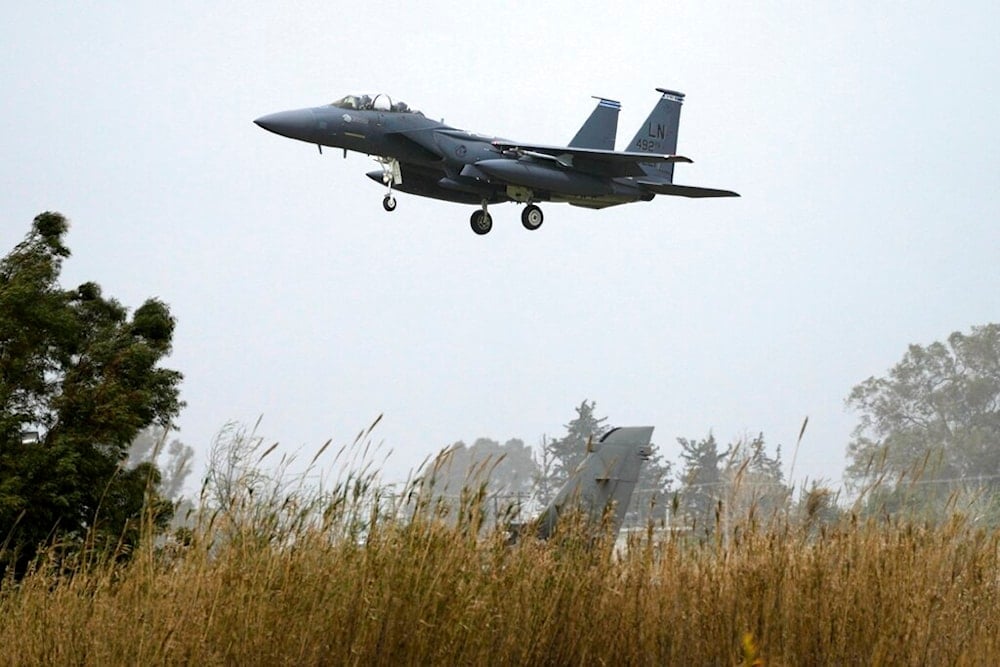Greek–Israeli alliance deepens as tensions with Turkiye escalate
Greece and the Israeli regime intensify military cooperation and pursue major arms deals amid rising tensions with Turkiye over maritime borders and regional influence.
-

A US F-15 fighter jet prepares for landing at the Andravida air base, about 279 kilometres (174 miles) southwest of Athens, Friday, April 1, 2022 (AP)
The Israeli regime and Greece have recently intensified their diplomatic and military cooperation, driven by what Athens views as an escalating threat from Turkiye in the eastern Mediterranean.
Greek officials told the Israeli N12 that although coordination between the sides slowed during the Gaza war, both capitals have revived their efforts with stronger momentum, particularly as Ankara continues expanding its military posture in the region. Discussions over a major arms deal have resumed, involving air-defense systems and PULS rocket launchers from Israeli weapons manufacturer Elbit, valued in the billions of shekels.
The officials noted that cooperation is expected to become “stronger and more public,” pointing to a recent joint aerial exercise over the Middle East described as a “message to the Turks.” Greece, according to the sources, intends to finalize the arms deal before its 2027 elections to bolster its defenses.
Athens’ position stems from the ongoing dispute with Turkiye over maritime borders and offshore rights around Greek islands. Greek officials warned that Ankara’s insistence on questioning Greek sovereignty could spark a wider confrontation. “If you look at the number of countries they have invaded, why not?” one source said, expressing fear of a potential Turkish attempt to take over a Mediterranean island.
'Anti-Turkiye regional axis'
Cyprus is also strengthening ties with the Israeli regime as part of what Greek sources call a tightening regional axis countering Turkiye. Nicosia recently acquired Israeli air-defense systems, prompting Turkish accusations of attempts to destabilize the balance in the island nation.
Former Israeli ambassador to Cyprus Michael Harari said the crisis between Ankara and Tel Aviv across multiple fronts, Syria, Gaza, and the Mediterranean, has pushed Athens and “Israel” closer. He emphasized that Greece and Cyprus demonstrated “firm strategic unity” with the Israeli regime during the war.
Both the Israeli regime and Greece are exercising joint diplomatic pressure to block Turkiye from acquiring F-35 fighter jets, which they believe would shift the regional balance. Moreover, they seek to ensure Turkiye does not secure a role in Gaza’s post-war arrangements, with the Israeli prime minister calling Turkish presence in Gaza a “red line.” Greek sources echoed that position, saying, “We want to prevent Turkish intervention in Gaza. If they gain influence there, it would be a failure for all of us.”
Greek sources concluded that if tensions devolve into open conflict, they expect military support from “Israel,” Cyprus, and France, though they fear that other Western states may not back them. “We are trying to build an axis with ‘Israel’ and Cyprus to contain the Turks,” one source said. “The Turks are building an empire.”
Israeli purchases sound alarm in Cyprus
A sharp rise in Israeli real estate acquisitions across Cyprus has sparked growing concern over national sovereignty and affordability, with political debate intensifying after a recent congress by AKEL, Cyprus’ second-largest party, where criticism of the purchases was quickly met with accusations of antisemitism, a familiar Israeli tactic to silence legitimate scrutiny.
Party leader Stefanos Stefanou warned of what he called a growing “national security threat,” citing Israeli land purchases near sensitive sites and highlighting a coordinated effort, led by the buyers, to establish closed communities, Zionist schools, and influence over key economic sectors.
“If we don’t take effective action now, one day we’ll find that this country is no longer ours,” he stressed, urging government intervention.
Stefanou rejected claims of xenophobia following his reference to historical parallels with how Israelis settled the land of Palestine after occupying its territories. This instantly drew backlash, with critics waving the antisemitic card, again, though supporters argue his comments reflected concerns over sovereignty, not ethnicity, and were aimed at highlighting patterns of unregulated land acquisition.

 4 Min Read
4 Min Read








